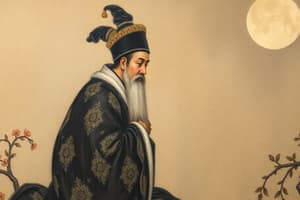Podcast
Questions and Answers
What are the five key virtues of Confucianism, and what does each one emphasize?
What are the five key virtues of Confucianism, and what does each one emphasize?
The five key virtues are Li (ritual and etiquette), Hsiao (love within the family), Yi (righteousness), Xin (honesty and trustworthiness), and Jen (benevolence and humaneness). Each virtue emphasizes different aspects of personal ethics and social harmony.
Explain the significance of 'Jen' in Confucianism.
Explain the significance of 'Jen' in Confucianism.
'Jen' represents benevolence and humaneness towards others, considered the highest virtue in Confucianism. It underscores the importance of compassion and empathy in human interactions.
How does the concept of 'Hsiao' define relationships within a family in Confucian thought?
How does the concept of 'Hsiao' define relationships within a family in Confucian thought?
'Hsiao' emphasizes the love between parents and children, highlighting the importance of familial bonds and respect. It reinforces the idea that strong family ties are foundational to societal stability.
What does the 'Golden Rule' in Confucianism imply about ethical behavior?
What does the 'Golden Rule' in Confucianism imply about ethical behavior?
What role does 'Chung' play in the context of Confucianism?
What role does 'Chung' play in the context of Confucianism?
Flashcards are hidden until you start studying
Study Notes
Confucianism: Key Concepts
- Li: Refers to ritual, propriety, and etiquette, signifying the importance of social order and proper conduct.
- Hsiao: Represents love within the family, emphasizing the bond between parents and children.
- Yi: Stands for righteousness, highlighting the importance of moral principles and doing what is right.
- Xin: Focuses on honesty and trustworthiness, emphasizing the value of integrity and truthfulness.
- Jen: The highest Confucian virtue, representing benevolence and humaneness towards others.
- Chung: Signifies loyalty to the state, stressing the importance of patriotism and civic duty.
Confucianism: Core Principles
- Emphasizes the importance of personal ethics and morality as the foundation for a peaceful society.
- Values ancestor worship, believing in the connection between the living and the deceased.
- Focuses on human-centered virtues, advocating for a life based on compassion, respect, and responsibility.
- Golden rule: "Do not do unto others what you would do not want others to do unto you."
- Often referred to as "The school of the scholars," recognizing its emphasis on education and intellectual pursuits.
Studying That Suits You
Use AI to generate personalized quizzes and flashcards to suit your learning preferences.




